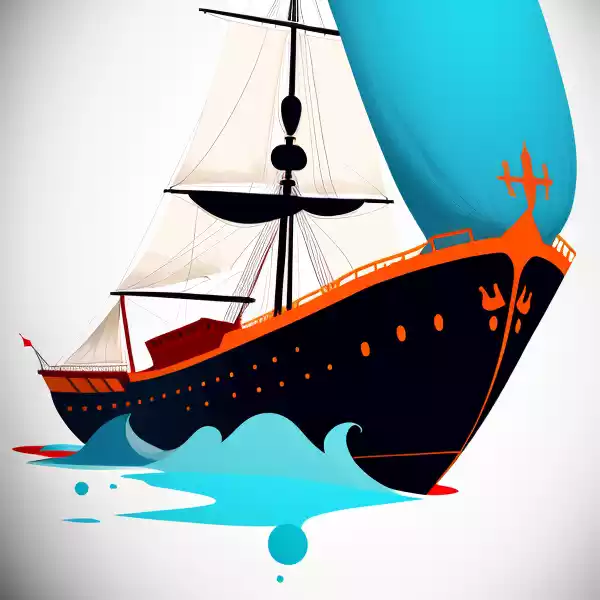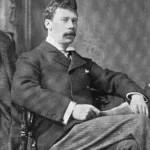 | |
The Lady of the Ship | |
| Author | Arthur Quiller-Couch |
|---|---|
| Published |
1899
|
| Language | English |
| Nationality | British |
| Genre | Editing, Literary Criticism |
1899 Short Story
The Lady of the Ship
The Lady of the Ship is an English Editing, Literary Criticism short story by British writer Arthur Quiller-Couch. It was first published in 1899.
The Lady of the Ship
by Arthur Quiller-Couch
[Or so much as is told of her by Paschal Tonkin, steward and major-domo to the lamented John Milliton, of Pengersick Castle, in Cornwall: of her coming in the Portugal Ship, anno 1526; her marriage with the said Milliton and alleged sorceries; with particulars of the Barbary men wrecked in Mount’s Bay and their entertainment in the town of Market Jew.]
My purpose is to clear the memory of my late and dear Master; and to this end I shall tell the truth and the truth only, so far as I know it, admitting his faults, which, since he has taken them before God, no man should now aggravate by guess-work. That he had traffic with secret arts is certain; but I believe with no purpose but to fight the Devil with his own armoury. He never was a robber as Mr. Thomas St. Aubyn and Mr. William Godolphin accused him; nor, as the vulgar pretended, a lustful and bloody man. What he did was done in effort to save a woman’s soul; as Jude tells us, “Of some have compassion, that are in doubt; and others save, having mercy with fear, pulling them out of the fire, hating even the garment spotted by the flesh“–though this, alas! my dear Master could not. And so with Jude I would end, praying for all of us and ascribing praise to the only wise God, our Saviour, who is able to guard us from stumbling and set us faultless before His presence with exceeding joy.
It was in January, 1526, after a tempest lasting three days, that the ship called the Saint Andrew, belonging to the King of Portugal, drove ashore in Gunwallo Cove, a little to the southward of Pengersick. She was bound from Flanders to Lisbon with a freight extraordinary rich–as I know after a fashion by my own eyesight, as well as from the inventory drawn up by Master Francis Porson, an Englishman, travelling on board of her as the King of Portugal’s factor. I have a copy of it by me as I write, and here are some of Master Porson’s items:–
8,000 cakes of copper, valued by him at 3,224 pounds. 18 blocks of silver, ‘ ‘ ‘ 2,250 ‘. Silver vessels, plate, patens, ewers and pots, beside pearls, precious stones, and jewels of gold. Also a chest of coined money, in amount 6,240 ‘.
There was also cloth of arras, tapestry, rich hangings, satins, velvets, silks, camlets, says, satins or Bruges, with great number of bales of Flemish and English cloth; 2,100 barber’s basins; 3,200 laten candlesticks; a great chest of shalmers and other instruments of music; four sets of armour for the King of Portugal, much harness for his horses, and much beside–the whole amounting at the least computation to 16,000 pounds in value. [1] And this I can believe on confirmation of what I myself saw upon the beach.
But let me have done with Master Porson and his tale, which runs that the Saint Andrew, having struck at the mouth of the cove, there utterly perished; yet, by the grace and mercy of Almighty God, the greater part of the crew got safely to land, and by help of many poor folk dwelling in the neighbourhood saved all that was most valuable of the cargo. But shortly after (says he) there came on the scene three gentlemen, Thomas Saint Aubyn, William Godolphin, and John Milliton, with about sixty men armed in manner of war with bows and swords, and made an assault on the shipwrecked sailors and put them in great fear and jeopardy; and in the end took from them all they had saved from the wreck, amounting to 10,000 pounds worth of treasure–“which,” says he, “they will not yield up, nor make restitution, though they have been called upon to do so.”
So much then for the factor’s account, which I doubt not he believed to be true enough; albeit on his own confession he had lain hurt and unconscious upon the beach at the time, and his tale rested therefore on what he could learn by hearsay after his recovery; when–the matter being so important–he was at trouble to journey all the way to London and lay his complaint before the Portuguese ambassador. Moreover he made so fair a case of it that the ambassador obtained of the English Court a Commissioner, Sir Nicholas Fleming, to travel down and push enquiries on the spot–where Master Porson did not scruple to repeat his accusation, and to our faces (having indeed followed the Commissioner down for that purpose). I must say I thought him a very honest man–not to say a brave one, seeing what words he dared to use to Mr. Saint Aubyn in his own house at Clowance, calling him a mere robber. I was there when he said it and made me go hot and cold, knowing (if he did not) that for two pins Mr. Saint Aubyn might have had him drowned like a puppy. However, he chose to make nothing of an insult from a factor. “Mercator tantum,” replied he, snapping his fingers, and to my great joy; for any violence might have spoiled the story agreed on between us–that is, between Mr. Saint Aubyn, Mr. Godolphin, and me who acted as deputy for my Master.
This story of ours, albeit less honest, had more colour of the truth than Master Porson’s hearsay. It ran that Mr. Saint Aubyn, happening near Gunwallo, heard of the wreck and rode to it, where presently Mr. Godolphin and my Master joined him and helped to save the men; that, in attempting to save the cargo also, a man of Mr. Saint Aubyn’s–one Will Carnarthur–was drowned; that, in fact, very little was rescued; and, seeing the men destitute and without money to buy meat and drink, we bought the goods in lawful bargain with the master. As for the assault, we denied it, or that we took goods to the value of ten thousand pounds from the sailors. All that was certainly known to be saved amounted to about 20 pounds worth; and, in spite of many trials to recover more, which failed to pay the charges of labour, the bulk of the cargo remained in the ship and was broken up by the seas.
This was our tale, false in parts, yet a truer one than either of us, who uttered it, believed. The only person in the plot (so to say) who knew it to be true in substance was my Master. I, his deputy, took this version from him to Clowance with a mind glad enough to be relieved by my duty from having any opinion on the matter. On the one hand, I had the evidence of my senses that the booty had been saved, and too much wit to doubt that any other man would conclude it to be in my Master’s possession. On the other, I had never known him lie or deceive, or engage me to further any deceit; his word was his bond, and by practice my word was his bond also. Further, of this affair I had already begun to wonder if a man’s plain senses could be trusted, as you will hear reason by-and-by. As for Mr. Saint Aubyn and Mr. Godolphin, they had no doubt at all that my Master was lying, and that I had come wittingly to further his lie. They would have drawn on him (I make no doubt) had he brought the tale in person. From me, his intermediate, they took it as the best to suit with the known truth and present to the Commissioner. All Cornishmen are cousins, you may say. It comes to this, rather: these gentlemen chose to accept my master’s lie, and settle with him afterwards, rather than make a clean breast and be forced to wring their small shares out of the Exchequer. A neighbour can be persuaded, terrified, forced; but London is always a long way off, and London lawyers are the devil. I say freely that (knowing no more than they did, or I) these two gentlemen followed a reasonable policy.
But, after we had fitted Sir Nicholas with our common story, and as I was mounting my horse in Clowance courtyard, Mr. Saint Aubyn came close to my stirrup and said this by way of parting:
“You will understand, Mr. Tonkin, that to-day’s tale is for to-day. But by God I will come and take my share–you may tell your master–and a trifle over! And the next time I overtake you I promise to put a bullet in the back of your scrag neck.”
For answer to this–seeing that Master Porson stood at an easy distance with his eye on us–I saluted him gravely and rode out of the courtyard.
Now the manner of the wreck was this, and our concern with it. So nearly as I can learn, the Saint Andrew came ashore at two hours after noon: the date, the 20th of January, 1526, and the weather at the time coarse and foggy with a gale yet blowing from the south-west or a good west of south, but sensibly abating, and the tide wanting an hour before low water.
It happened that Mr. Saint Aubyn was riding, with twenty men at his back, homeward from Gweek, where he had spent three days on some private business, when he heard news of the wreck at a farmhouse on the road to Helleston: and so turning aside, he, whose dwelling lay farthest from it, came first to the cove. The news reached us at Pengersick a little after three o’clock; as I remember because my Master was just then settled to dinner. But he rose at once and gave word to saddle in haste, at the same time bidding me make ready to ride with him, and fifteen others.
So we set forth and rode–the wind lulling, but the rain coming down steadily–and reached Gunwallo Cove with a little daylight to spare. On the beach there we found most of the foreigners landed, but seven of them laid out starkly, who had been drowned or brought ashore dead (for the yard had fallen on board, the day before, and no time left in the ship’s extremity to bury them): and three as good as dead–among whom was Master Porson, with a great wound of the scalp; also everywhere great piles of freight, chests, bales, and casks–a few staved and taking damage from salt water and rain, but the most in apparent good condition. The crew had worked very busily at the salving, and to the great credit of men who had come through suffering and peril of death. Mr. Saint Aubyn’s band, too, had lent help, though by this time the flowing of the tide forced them to give over. But the master (as one might say) of their endeavours was neither the Portuguese captain nor Mr. Saint Aubyn, but a young damsel whom I must describe more particularly.
She was standing, as we rode down the beach, nigh to the water’s edge; with a group of men about her, and Mr. Saint Aubyn himself listening to her orders. I can see her now as she turned at our approaching and she and my Master looked for the first time into each other’s eyes, which afterwards were to look so often and fondly. In age she appeared eighteen or twenty; her shape a mere girl’s, but her face somewhat older, being pinched and peaked by the cold, yet the loveliest I have ever seen or shall see. Her hair, which seemed of a copper red, darkened by rain, was blown about her shoulders, and her drenched blue gown, hitched at the waist with a snakeskin girdle, flapped about her as she turned to one or the other, using more play of hands than our home-bred ladies do. Her feet were bare and rosy; ruddied doubtless, by the wind and brine, but I think partly also by the angry light of the sunsetting which broke the weather to seaward and turned the pools and the wetted sand to the colour of blood. A hound kept beside her, shivering and now and then lowering his muzzle to sniff the oreweed, as if the brine of it puzzled him: a beast in shape somewhat like our grey-hounds, but longer and taller, and coated like a wolf.
As I have tried to describe her she stood amid the men and the tangle of the beach; a shape majestical and yet (as we drew closer) slight and forlorn. The present cause of her gestures we made out to be a dark-skinned fellow whom two of Saint Aubyn’s men held prisoner with his arms trussed behind him. On her other hand were gathered the rest of the Portuguese, very sullen and with dark looks whenever she turned from them to Saint Aubyn and from their language to the English. He, I could see, was perplexed, and stood fingering his beard: but his face brightened as he came a step to meet my Master.
“Ha!” said he, “you can help us, Milliton. You speak the Portuguese, I believe?” (For my master was known to speak most of the languages of Europe, having caught them up in his youth when his father’s madness forced him abroad. And I myself, who had accompanied him so far as Venice, could pick my way in the lingua Franca.) “This fellow”– pointing at the prisoner–“has just drawn a knife on the lady here; and indeed would have killed her, but for this hound of hers. My fellows have him tight and safe, as you see: but I was thinking by your leave to lodge him with you, yours being the nearest house for the safe keeping of such. But the plague is,” says he, “there seems to be more in the business than I can fathom: for one half of these drenched villains take the man’s part, while scarce one of them seems too well disposed towards the lady: although to my knowledge she has worked more than any ten of them in salving the cargo. And heaven help me if I can understand a word of their chatter!”
My Master lifted his cap to her; and she lifted her eyes to him, but never a word did she utter, though but a moment since she had been using excellent English. Only she stood, slight and helpless and (I swear) most pitiful, as one saying, “Here is my judge. I am content.”
My Master turned to the prisoner and questioned him in the Portuguese. But the fellow (a man taller than the rest and passably straight-looking) would confess nothing but that his name was Gil Perez of Lagos, the boatswain of the wrecked ship. Questioned of the assault, he shook his head merely and shrugged his shoulders. His face was white: it seemed to me unaccountably, until glancing down I took note of a torn wound above his right knee on the inside, where the hound’s teeth had fastened.
“But who is the captain of the ship?” my Master demanded in Portuguese; and they thrust forward a small man who seemed not over-willing. Indeed his face had nothing to commend him, being sharp and yellow, with small eyes set too near against the nose.
“Your name?” my Master demanded of him too.
“Affonzo Cabral,” he answered, and plunged into a long tale of the loss of his ship and how it happened. Cut short in this and asked concerning the lady, he shrugged his shoulders and replied with an oath he knew nothing about her beyond this, that she had taken passage with him at Dunquerque for Lisbon, paying him beforehand and bearing him a letter from the Bishop of Cambrai, which conveyed to him that she was bound on some secret mission of politics to the Court of Lisbon.
As I thought, two or three of the men would have murmured something here, but for a look from her, who, turning to my Master, said quietly in good English:
“That man is a villain. My name is Alicia of Bohemia, and my mission not to be told here in public. But he best knows why he took me for passenger, and how he has behaved towards me. Yourselves may see how I have saved his freight. And for the rest, sir”–here she bent her eyes on my Master very frankly–“I have proved these men, and claim to be delivered from them.”
At this my Master knit his brows: and albeit he was a young man (scarce past thirty) and a handsome, the deep wedge-mark showed between them as I had often seen it show over the nose of the old man his father.
“I think,” said he to Mr. Saint Aubyn, “this should be inquired into at greater leisure. With your leave my men shall take the prisoner to Pengersick and have him there in safe keeping. And if”–with a bow–” the Lady Alicia will accept my poor shelter it will be the handier for our examining of him. For the rest, cannot we be of service in rescuing yet more of the cargo?”
But this for the while was out of question: the Saint Andrew lying well out upon the strand, with never fewer than four or five ugly breakers between her and shore; and so balanced that every sea worked her to and fro. Moreover, her mizzen mast yet stood, as by a miracle, and the weight of it so strained at her seams that (thought I) there could be very little left of her by the next ebb.
By now, too, the night was closing down, and we must determine what to do with the cargo saved. Mr. Godolphin, who had arrived with his men during my Master’s colloquy, was ready with an offer of wains and pack-horses to convey the bulk of it to the outhouses at Godolphin. But this, when I interpreted it, the Portuguese captain would not hear. Nor was he more tractable to Mr. Saint Aubyn’s offer to set a mixed guard of our three companies upon the stuff until daybreak. He plainly had his doubts of such protection: and I could not avoid some respect for his wisdom while showing it by argument to be mere perversity. To my Master’s persuasions and mine he shook his head: asking for the present to be allowed a little fuel and refreshment for his men, who would camp on the beach among their goods. And to this, in the end, we had to consent. Several times before agreeing–and perhaps more often than need was–my Master consulted with the Lady Alicia. But she seemed indifferent what happened to the ship. Indeed, she might well have been overwearied.
At length, the Portugals having it their own way, we parted: Mr. Saint Aubyn riding off to lodge for the night with Mr. Godolphin, who took charge of the three wounded men; while we carried the Lady Alicia off to Pengersick (whither the prisoner Gil Perez had been marched on ahead), she riding pillion behind my Master, and the rest of us at a seemly distance.
On reaching home I had first to busy myself with orders for the victuals to be sent down to the foreigners at the Cove, and afterwards in snatching my supper in the great hall, where already I saw my Master and the strange lady making good cheer together at the high table. He had bidden the housekeeper fetch out some robes that had been his mother’s, and in these antique fittings the lady looked not awkwardly (as you might suppose), but rather like some player in a masque. I know not how ’twas: but whereas (saving my respect) I had always been to my dear Master as a brother, close to his heart and thoughts, her coming did at once remove him to a distance from me, so that I looked on the pair as if the dais were part of some other world than this, and they, pledging each other up there and murmuring in foreign tongues and playing with glances, as two creatures moving through a play or pisky tale without care or burden of living, and yet in the end to be pitied.
My fast broken, I bethought me of our prisoner; and catching up some meats and a flask of wine, hurried to the strong room where he lay. But I found him stretched on his pallet, and turning in a kind of fever: so returned and fetched a cooling draught in place of the victuals, and without questioning made him drink it. He thanked me amid some rambling, light-headed talk–the most of it too quickly poured out for me to catch; but by-and-by grew easier and drowsy. I left him to sleep, putting off questions for the morning.
But early on the morrow–between five and six o’clock–came Will Hendra, a cowkeeper, into our courtyard with a strange tale; one that disquieted if it did not altogether astonish me. The tale–as told before my Master, whom I aroused to hear it–ran thus: that between midnight and one in the morning the Portugals in the Cove had been set upon and beaten from the spoils by a number of men with pikes (no doubt belonging to Saint Aubyn or Godolphin, or both), and forced to flee to the cliffs. But (here came in the wonder) the assailants, having mastered the field, fell on the casks, chests, and packages, only to find them utterly empty or filled with weed and gravel! Of freight–so Will Hendra had it from one of Godolphin’s own men, who were now searching the cliffs and caverns–not twelve-pennyworth remained on the beach. The Portugals must have hidden or made away with it all. He added that their captain had been found at the foot of the cliffs with his head battered in; but whether by a fall or a blow taken in the affray, there was no telling.
My Master let saddle at once and rode away for the Cove without breaking his fast. And I went about my customary duties until full daybreak, when I paid a visit to the strong room, to see how the prisoner had slept.
I found him sitting up in bed and nursing his leg, the wound of which appeared red and angry at the edges. I sent, therefore, for a fomentation, and while applying it thought no harm to tell him the report from the Cove. To my astonishment it threw him into a transport, though whether of rage or horror I could not at first tell. But he jerked his leg from my grasp, and beating the straw with both fists he cried out–
“I knew it! I knew it would be so! She is a witch–a daughter of Satan, or his leman! It is her doing, I tell you. It is she who has killed that fool Affonzo. She is a witch!” He fell back on the straw, his strength spent, but still beat weakly with his fists, gasping “Witch–witch!”
“Hush!” said I. “You are light-headed with your hurt. Lie quiet and let me tend it.”
“As for my hurt,” he answered, “your tending it will do no good. The poison of that hound of hell is in me, and nothing for me but to say my prayers. But listen you”–here he sat up again and plucked me by the shoulder as I bent over his leg. “The freight is not gone, and good reason for why: it was never landed!”
“Hey?” said I, incredulous.
“It was never landed. The men toiled as she ordered–Lord, how they toiled! Without witch-craft they had never done the half of it. I tell you they handled moonshine–wove sand. The riches they brought ashore were emptiness; vain shows that already have turned to chips and straw and rubbish. Nay, sir”–for I drew back before these ravings–“listen for the love of God, before the poison gets hold of me! Soon it will be too late. . . . The evening before we sailed from Dunquerque, we were anchored out in the tide. It was my watch. I was leaning on the rail of the poop when I caught sight of her first. She was running for her life across the dunes–running for the waterside–she and her hound beside her. Away behind her, like ants dotted over the rises of the sand, were little figures running and pursuing. Down by the waterside one boat was waiting, with a man in it–or the Devil belike–leaning on his oars. She whistled; he pulled close in shore. She leapt into the boat with the dog at her heels, and was half-way across towards our ship before the first of those after her reached the water’s edge. When she hailed us I ran and fetched Affonzo the master. The rest I charge to his folly. It was he who handed her up the ship’s side. How the dog came on board I know not: only that I leaned over the bulwarks to have a look at him, but heard a pattering noise, and there he was on deck behind me and close beside his mistress. The boat and rower had vanished–under the ship’s stern, as I supposed, but now I have my doubts. I saw no more of them, anyhow.
“By this time Affonzo was reading her letter. The crowd by the water’s edge had found a boat at length–how, I know not; but it was a very little one, holding but six men besides the one rower, and then over-laden. They pulled towards us and hailed just as the lady took the master’s promise and went down to seek her cabin: and one of the men stood up, a tall gentleman with a chain about his neck. Affonzo went to the side to parley with him.
“The tall man with the chain cried out that he was mayor or provost– I forget which–and the woman must be given up as a proved witch who had laid the wickedest spells upon many citizens of Dunquerque. All this he had to shout; for Affonzo, who–either ignorantly or by choice–was already on Satan’s side, would not suffer him to come aboard or even nigh the ship’s ladder. Moreover, he drove below so many of our crew as had gathered to the side to listen, commanding me with curses to see to this. Yet I heard something of the mayor’s accusation; which was that the woman had come to Dunquerque, travelling as a great lady with a retinue of servants and letters of commendation to the religious houses, on which and on many private persons of note she had bestowed relics of our Lord and the saints, pretending it was for a penance that she journeyed and gave the bounties: but that, at a certain hour, these relics had turned into toads, adders, and all manner of abominable offal, defiling the holy places and private shrines, in some instances the very church altars: that upon the outcry her retinue had vanished, and she herself taken to flight as we saw her running.
“At all this Affonzo scoffed, threatening to sink the boat if further troubled with their importunities. And, the provost using threats in return, he gave order to let weigh incontinently and clear with the tide, which by this was turned to ebb. And so, amid curses which we answered by display of our guns, we stood out from that port. Of the master’s purpose I make no guess. Either he was bewitched, or the woman had taken him with her beauty, and he dreamed of finding favour with her.
“This only I know, that on the second morning, she standing on deck beside him, he offered some familiar approach; whereupon the dog flew at him, and I believe would have killed him, but was in time called off by her. Within an hour we met with the weather which after three days drove us ashore. Now whether Affonzo suspected her true nature or not– as I know he had taken a great fear of her–I never had time to discover. But I know her for a witch, and for a witch I tried to make away with her. For the rest, may God pardon me!”
All this the man uttered not as I have written it, but with many gasping interruptions; and afterwards lay back as one dead. Before I could make head or tail of my wonder, I heard cries and a clatter from the courtyard, and ran out to see what was amiss.
In the courtyard I found my Master with a dozen men closing the bolts of the great gate against a company who rained blows and hammerings on the outside of it. My Master had dismounted, and while he called his orders the blood ran down his face from a cut above the forehead. As for the smoking horses on which they had ridden in, these stood huddling, rubbing shoulders, and facing all ways like a knot of frightened colts.
All the bolts being shut, my Master steps to the grille and speaking through it, “Saint Aubyn,” says he, “between gentlemen there are fitter ways to dispute than brawling with servants. I am no thief or robber; as you may satisfy yourself by search and question, bringing, if you will, Mr. Godolphin and three men to help you under protection of my word. If you will not, then I am ready for you at any time of your choosing. But I warn you that, if any man offers further violence to my gate, I send Master Tonkin to melt the lead, of which I have good store. So make your choice.”
He said it in English, and few of those who heard him could understand. And after a moment Saint Aubyn, who was a very courteous gentleman for all his hot temper, made answer in the same tongue.
“If I cannot take your word, Pengersick,” said he, “be sure no searching will satisfy me. But that some of your men have made off with the goods, with or without your knowledge, I am convinced.”
“If they have–” my Master was beginning, when Godolphin’s sneering laugh broke in on his words from the other side of the gate.
“‘If!‘ ‘If!‘ There are too many if’s in this parley for my stomach. Look ye, Pengersick, will you give up the goods or no?”
Upon this my Master changed his tone. “As for Mr. Godolphin, I have this only to say: the goods are neither his nor mine; they are not in my keeping, nor do I believe them stolen by any of my men. For the words that have passed between us to-day, he knows me well enough to be sure I shall hold him to account, and that soon: and to that assurance commending him, I wish you both a very good day.”
So having said, he strolled off towards the stables, leaving me to listen at the gate, where by-and-by, after some disputing, I had the pleasure to hear our besiegers draw off and trot away towards Godolphin. Happening to take a glance upwards at the house-front, I caught sight of the strange lady at the window of the guest-chamber, which faced towards the south-east. She was leaning forth and gazing after them: but, hearing my Master’s footsteps as he came from the stables, she withdrew her eyes from the road and nodded down at him gaily.
But as he went indoors to join her at breakfast I ran after, and catching him in the porch, besought him to have his wound seen to. “And after that,” said I, “there is another wounded man who needs your attention. Unless you take his deposition quickly, I fear, sir, it may be too late.”
His eyebrows went up at this, but contracted again upon the twinge of his wound. “I will attend to him first,” said he shortly, and led the way to the strong room. “Hullo!” was his next word, as he came to the door–for in my perturbation and hurry I had forgotten to lock it.
“He is too weak to move,” I stammered, as my poor excuse.
“Nevertheless it was not well done,” he replied, pushing past me.
The prisoner lay on his pallet, gasping, with his eyes wide open in a rigor. “Take her away!” he panted. “Take her away! She has been here!”
“Hey?” I cried: but my Master turned on me sharply. To this day I know not how much of evil he suspected.
“I will summon you if I need you. For the present you will leave us here alone.”
Nor can I tell what passed between them for the next half-an-hour. Only that when he came forth my Master’s face was white and set beneath its dry smear of blood. Passing me, who waited at the end of the corridor, he said, but without meeting my eyes:
“Go to him. The end is near.”
I went to him. He lay pretty much as I had left him, in a kind of stupor; out of which, within the hour, he started suddenly and began to rave. Soon I had to send for a couple of our stablemen; and not too soon. For by this he was foaming at the mouth and gnashing, the man in him turned to beast and trying to bite, so that we were forced to strap him to his bed. I shall say no more of this, the most horrible sight of my life. The end came quietly, about six in the evening: and we buried the poor wretch that night in the orchard under the chapel wall.
All that day, as you may guess, I saw nothing of the strange lady. And on the morrow until dinner-time I had but a glimpse of her. This was in the forenoon. She stood, with her hound beside her, in an embrasure of the wall, looking over the sea: to the eye a figure so maidenly and innocent and (in a sense) forlorn that I recalled Gil Perez’ tale as the merest frenzy, and wondered how I had come to listen to it with any belief. Her seaward gaze would be passing over the very spot where we had laid him: only a low wall hiding the freshly turned earth. My Master had ridden off early: I could guess upon what errand.
He returned shortly after noon, unhurt and looking like a man satisfied with his morning’s work. And at dinner, watching his demeanour narrowly, I was satisfied that either he had not heard the prisoner’s tale or had rejected it utterly. For he took his seat in the gayest spirits, and laughed and talked with the stranger throughout the meal. And afterwards, having fetched an old lute which had been his mother’s, he sat and watched her fit new strings to it, rallying her over her tangle. But when she had it tuned and, touching it softly, began the first of those murmuring heathenish songs to which I have since listened so often, pausing in my work, but never without a kind of terror at beauty so far above my comprehending–why, then my Master laughed no more.
He had met Godolphin that morning and run him through the thigh. And that bitterest enemy of ours still wore a crutch a month later, when we faced Master Porson before the Commissioner in Saint Aubyn’s house at Clowance. At that conference (not to linger over the time between) the Commissioner showed himself pardonably suspicious of us all. He was a dry, foxy-faced man, who spoke little and at times seemed scarce to be listening; but rather turning over some deeper matters in his brain behind his grey-coloured eyes. But at length, Mr. Saint Aubyn having twice or thrice made mention of the Lady Alicia and her presence on the beach, this Sir Nicholas looked up at me sharply, and said he–“By all accounts this lady was a passenger shipped by







